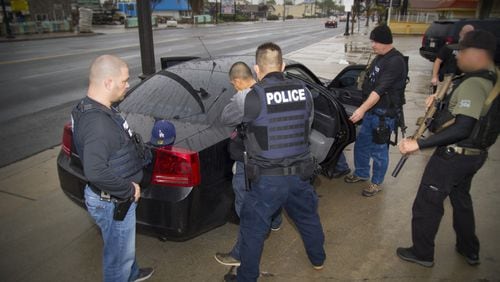The Trump administration on Tuesday issued stringent new guidelines to vastly bolster the nation’s border security, expand immigration detention, and expose many more unauthorized immigrants to deportation.
Contained in a pair of memos signed Monday by U.S. Homeland Security Secretary John Kelly, the guidelines are designed to implement President Donald Trump’s sweeping executive orders for cracking down on illegal immigration. They are addressed to the heads of U.S. Immigration and Customs Enforcement, U.S. Citizenship and Immigration Services and U.S. Customs and Border Protection.
In a briefing with reporters Tuesday, DHS officials stressed the guidelines are not intended to lead to “mass deportations” and that some of the directives will not take effect immediately.
“It is not intended to produce mass roundups of individuals – mass deportations,” a DHS official told reporters. “The president has been very clear on this issue that he wants to focus on criminals and convicted individuals and folks who pose public safety threats. But any time you are conducting law enforcement operations –- just because you have priorities doesn’t mean everyone else is exempt from potential enforcement.”
DHS officials also stressed the new guidelines do not apply to an Obama administration program – called Deferred Action for Childhood Arrivals, or DACA – that provides temporary deportation deferrals and work permits to young immigrants who were brought here as children. They also pointed out the memos do not call for National Guardsmen to round up unauthorized immigrants in the U.S. Federal officials considered such an idea but distanced themselves from it last week.
In the memos, Kelly cites a growing number of apprehensions on the southwest border. In November, for example, authorities made 47,215 arrests there, a 44 percent increase from the same month a year before.
“The surge of illegal immigration at the southern border has overwhelmed federal agencies and resources and has created a significant national security vulnerability to the United States,” Kelly wrote. “Thousands of aliens apprehended at the border, placed in removal proceedings, and released from custody have absconded and failed to appear at their removal hearings.”
Kelly’s guidelines expand the use of “expedited removal” proceedings — now limited to those who have been in the country for no more than 14 days and who have been apprehended within 100 miles of the border — to those who have been here for up to two years and who are caught anywhere in the U.S. And they authorize sending back to Mexico people –- from any country — who illegally cross the southwest border — pending their deportation proceedings — instead of detaining them in the U.S. Kelly said going that route could save detention center space and other resources.
Aimed at stopping the surge of unaccompanied immigrant children into the U.S., the memos say parents caught paying smugglers to bring their youngsters across the border could face prosecution and deportation.
The memos also:
• Call for expanding detention space along the southwest border and hiring 10,000 new ICE officers and agents and 5,000 additional Border Patrol officials. DHS officials could not immediately say Tuesday how much it would cost to hire them and where they will get the money.
• Instruct officials to come up with congressional budget requests for a new wall on the southwest border.
• Prioritize the deportation of unauthorized immigrants with criminal convictions as well as people whose charges have not yet been resolved and others who “have committed acts which constitute a chargeable criminal offense.” Those caught engaging in fraud or abusing public benefits programs could also face deportation.
• Immediately restore the Secure Communities program, which works by comparing detainees’ fingerprints against immigration records in federal databases. Supporters say the program — started during the George W. Bush administration — substantially curbed illegal immigration. Critics say it ensnared low-level offenders with families and deep roots in the U.S. The Obama administration canceled it, citing many of the concerns surrounding it.
• Seek to expand the 287(g) program, which authorizes local law enforcement authorities to help enforce federal immigration laws. Authorities from 32 law enforcement agencies in 16 states are now participating in the program, including officials in Cobb, Gwinnett, Hall and Whitfield counties. DHS officials call the program a “force multiplier,” while critics say it discourages immigrants from cooperating with local police.
• Instruct staff to create new regulations for assessing fines against unauthorized immigrants and those who “facilitate their unlawful presence in the United States.”
• Create an office to assist victims of unauthorized immigrants who commit crimes.
• Strip privacy protections from people who are not U.S. citizens or lawful permanent residents.
About the Author







